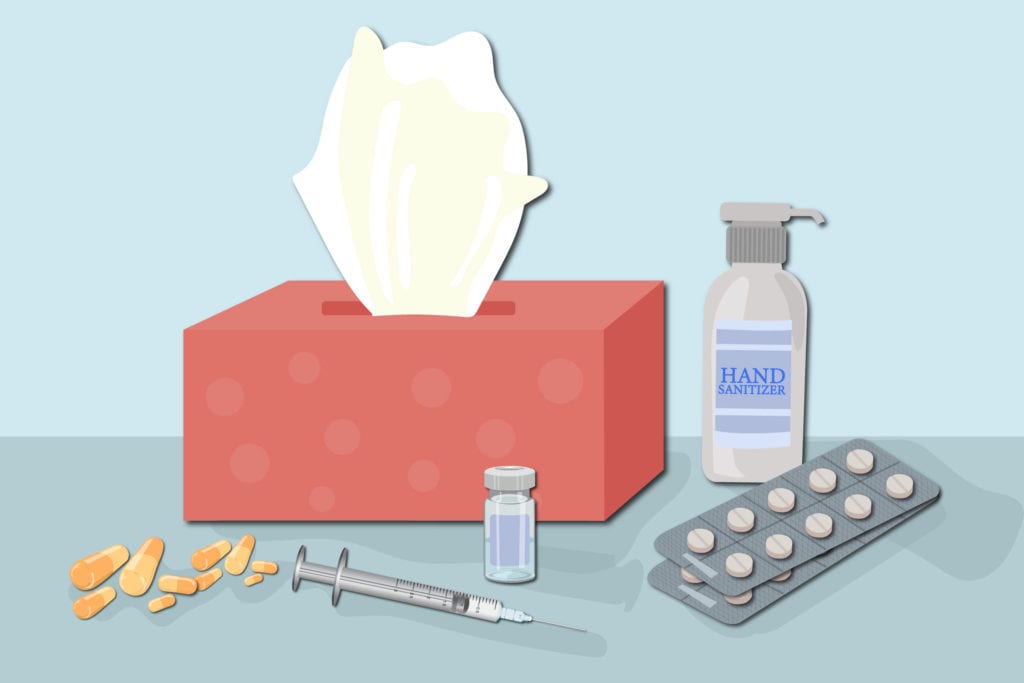

People living with inflammatory arthritis, which includes rheumatoid arthritis (RA), psoriatic arthritis, and ankylosing spondylitis, as well as other types of arthritis, know that it causes your immune system to mistakenly attack your body’s own cells.
But the condition also throws out of whack how your body deals with foreign invaders of the germ kind.
“It has been known for more than 50 years that patients with inflammatory arthritis are more susceptible to infections such as colds and flu,” says Chase Correia, MD, a Northwestern University Medicine rheumatologist and a member of the American College of Rheumatology Communications and Marketing Committee.
One Mayo Clinic study found that people with RA have twice the risk of general infection as people without.
How the Immune System Works Differently in Inflammatory Arthritis
Although you might think having an overactive immune system would make you *less* likely to get colds and flu, that’s actually not the case.
“It remains unclear exactly why the immune system is both overactive by attacking your own body, and underactive by failing to attack germs, but there is some evidence that in rheumatoid arthritis certain types of cells may be less effective at fighting infections than in unaffected individuals,” Dr. Correia says.
In other words, your immune system may be focused on attacking your own body rather than threats from outside.
“The risk of infection may vary with the activity of disease; people with higher disease activity have a higher risk of [colds and flu],” Dr. Correia says.
In addition, having inflammatory arthritis can make it harder to recover from seasonal illness. “It takes me twice as long as most people to come back from a virus because it always turns into longer-term bronchitis,” says CreakyJoints Patient Council member Cindi Arnsdorff of Georgia.
One study published in BMC Musculoskeletal Disorders not only found incidence of the flu to be higher in those with RA, but patients also had nearly a three-fold increased rate of complications.
How Arthritis Medications Affect Infection Risk
What’s more, the medications you take to treat arthritis can also make you susceptible to infection. Because drugs such as corticosteroids, some DMARDs (disease-modifying antirheumatic drugs like methotrexate) and biologics suppress your immune system, they may cause a greater vulnerability to outside illness. “Each medicine suppresses the immune system in a different way, but all have demonstrated an increased risk of infections,” says Dr. Correia.
However, “other traditional DMARDs such as plaquenil and sulfasalazine are not immunosuppressive, so they do not increase susceptibility to infection,” says rheumatologist Dee Dee Wu, MD, of the Hospital for Special Surgery in New York City.
Research has shown the specific combination of meds can also affect your infection risk: One study in the Journal of Translational Medicine found that adding biologics to a DMARD doubled the infection risk of the DMARD alone; biologics and corticosteroids increased it even further. Talk to your doctor to determine how likely your particular combination of medications is to increase your chances of getting sick.
But while your odds of getting sick during cold and flu season are greater than those of someone without inflammatory arthritis, there are smart steps you can take to fortify your immune system and make it less likely you’ll get sick.


1. First: Get a flu shot
You might think that having an immune-compromising disease means you shouldn’t get the flu vaccine, but that’s actually the exact opposite of what you should do. Unless your doctor recommends otherwise, you should get the flu shot every year.
“Vaccines decrease patients’ susceptibility to specific infections, so all high-risk patients, particularly those who are elderly and/or those on immunosuppressive agents, should receive the flu vaccine unless there is a contraindication,” Dr. Wu says.
Repeat after us: The flu shot itself will not make you sick.
It is important to note that your meds may affect how well the flu shot works. “For those who are on stable doses of methotrexate with low or no disease activity, there is some evidence that methotrexate can be held briefly for two weeks to improve the effectiveness of the flu vaccine without causing a flare in disease activity,” Dr. Correia says. Talk to your doctor to see what’s right for you.
2. Get a pneumonia vaccine
People with inflammatory arthritis are more vulnerable to developing complications from everyday infections, so getting vaccinated against pneumonia is critical too.
“The pneumonia vaccine is also recommended in adults 18 years or older for prevention of pneumococcal pneumonia,” Dr. Wu says. But, “there are two different types of pneumonia vaccines, so you should discuss the pneumonia vaccine with your physician as there are more factors to consider including your age, whether you have had a previous pneumonia vaccine, and if so, which one,” Dr. Correia says.
3. When possible, have your doctor prescribe the lowest dose of arthritis meds
“Generally speaking, the lowest dose of medication that controls your disease is the best strategy to avoid infections,” Dr. Correia says. “However, not all immunosuppressive medications have doses that can easily be changed. For example, corticosteroids can be given in virtually any dose whereas oral methotrexate can only be given in multiples of 2.5 mg. Finally, some of the biologic medications have fixed doses that do not allow much control in dosing at all.” Of course, never alter your medication regimen without your doctor’s approval.
4. If you do get sick, ask if you should stop your meds
Your doctor may recommend stopping medications that are immunosuppressive during an active infection and then resuming them once your infection has cleared, Dr. Wu says. That may reduce the severity and length of your illness.
5. Practice regular cold and flu prevention
The lifestyle practices that help everyone stay healthy during cold and flu season are extra important for you. “Take standard precautions to allow the immune system to function optimally, which include regular hand washing with soap, staying hydrated, eating healthy meals, sleeping seven to eight hours per night, going to bed at a consistent time, exercising regularly, and reducing unnecessary stress,” Dr. Correia says.
Plus, nutrition, sleep, and exercise are also important ways to keep your disease under control. Because uncontrolled disease activity means higher risk of getting sick, these lifestyle habits could kill two birds with one stone.
6. Stop smoking
If you’re a smoker with inflammatory arthritis, your doctor has probably already talked to you about stopping smoking, and cold and flu prevention is just another reason to get help quitting.
“Not only does smoking increase the disease activity, but it can also increase the risk of infections,” Dr. Correia says.
7. Become a germaphobe
“Every fall I stock up on face masks, rubber gloves, hand sanitizers and wipes, and in public I become aware of touching anything that other people may have touched, like door handles, grocery carts, gas station pumps, or pharmacy credit card touch pads,” Arnsdorff says. “During the height of the flu season I’ve offered hand sanitizers to the check-out cashier at grocery stores so that they don’t pass on the germs to me that they’ve picked up from handling products from customers before me.”
In addition, she recommends using your non-dominant hand, your elbow or the back of your hand to touch public surfaces like elevator buttons. “That way I’m not touching my eyes or mouth later,” she says. Dr. Correia also advises becoming more mindful to avoid touching your face at all.
8. Keep your distance
No one wants to be around someone who’s sick, but for those with suppressed immune systems, it’s even more critical. “Avoiding close contact with an actively infected person is also important in limiting airborne transmission,” Dr. Wu says. “Increase ventilation if possible if in close contact with an infected individual. Wearing a mask may be appropriate.”
9. Speak up
Other people aren’t mind readers, so let them know you’re immune compromised. Chances are, they’ll be sympathetic to your increased risk of sickness.
“If I hear someone coughing near me, say at church or a concert or on an airplane, I ask if they are sick and tell them I have an autoimmune disorder, and I move if they say they are sick,” Arnsdorff says. “As a last resort, I pull out the old, ‘I’m on a cancer drug, and need to be careful.’ Methotrexate comes in handy at times!”
10. Don’t buy into cold prevention hype
“Many of the therapies that you may have heard about to prevent infections including vitamin C, echinacea, and zinc have conflicting evidence and cannot be widely recommended,” Dr. Correia says. Instead, stick to proven strategies that doctors know work.
Although living with inflammatory arthritis can be tough for so many reasons — including an increased risk of seasonal illness — you do have the power to reduce your chances of getting sick.





